Bradley Byrne introduces bill to determine time, money ‘wasted’ by impeachment proceedings

Alabama 1st District U.S. Rep. and U.S. Senate hopeful Bradley Byrne on Thursday introduced legislation to determine the true costs of the taxpayer-funded impeachment proceedings of President Donald Trump. Dubbed, the SHAM Act, or the Statement of Harm to the American Majority, the bill requires the Government Accountability Office (GAO) to conduct an audit of the use of funds and loss of government productivity for both the Legislative Branch and the Executive Branch due to the impeachment inquiry and trial of Trump. The audit must include costs, time spent, expenses, and estimations on the loss of productivity. “Tragically, there was no bigger loser in the Democrats’ impeachment sham than the American people,” said Byrne. “The SHAM Act will determine the true costs of this taxpayer-funded political hit job that kept Congress from addressing real issues that actually matter to the American people. The American people deserve to see just how much time and money was wasted on this sham, so the Democrats can be held accountable for what they have done to our country.” The bill, H.R. 5769, currently has 31 cosponsors including Alabama 5th District U.S. Rep. Mo Brooks.
No solution to shutdown in sight before Dems take House
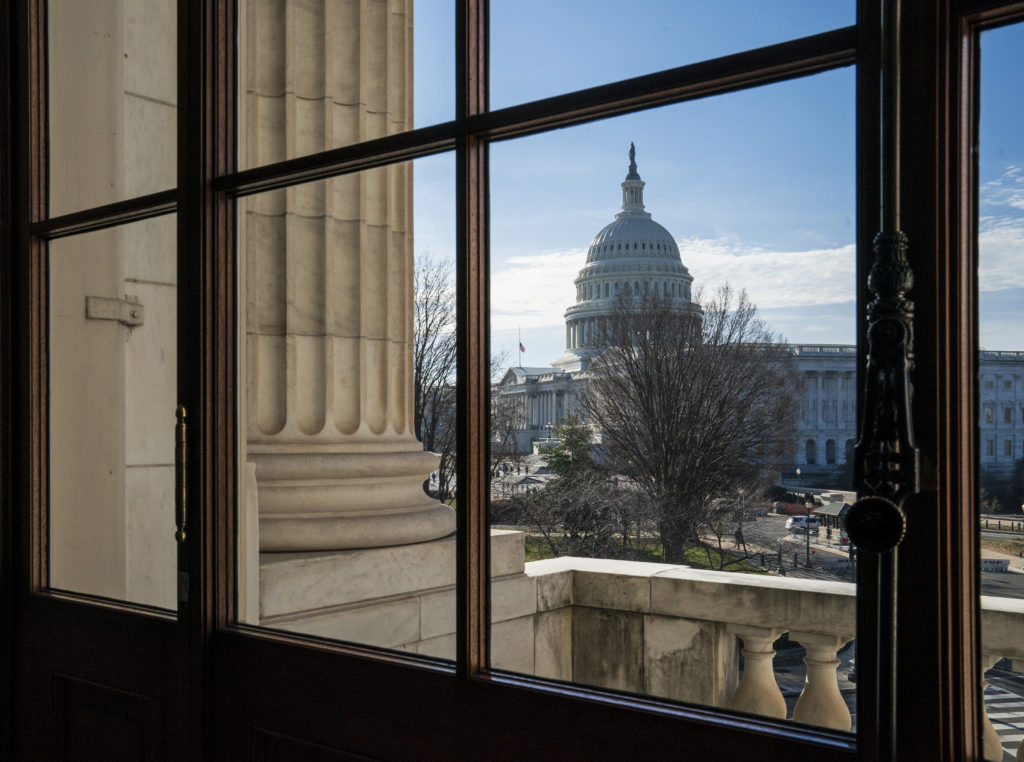
The partial government shutdown will almost certainly be handed off to a divided government to solve in the new year — the first big confrontation between President Donald Trump and newly empowered Democrats — as agreement eludes Washington in the waning days of the Republican monopoly on power. Now nearly a week old, the impasse is idling hundreds of thousands of federal workers and beginning to pinch citizens who count on varied public services. Gates are closed at some national parks, the government won’t issue new federal flood insurance policies and in New York, the chief judge of Manhattan federal courts suspended work on civil cases involving U.S. government lawyers, including several civil lawsuits in which Trump himself is a defendant. Congress is closing out the week without a resolution in sight over the issue holding up an agreement — Trump’s demand for money to build a border wall with Mexico and Democrats’ refusal to give him what he wants. That sets up a struggle upfront when Democrats take control of the House on Jan. 3. Trump raised the stakes on Friday, reissuing threats to shut the U.S.-Mexico border to pressure Congress to fund the wall and to cease aid to three Central American countries from which many migrants have fled. The president also has signaled he welcomes the fight as he heads toward his own bid for re-election in 2020, tweeting Thursday evening that Democrats may be able to block him now, “but we have the issue, Border Security. 2020!” With another long holiday weekend coming, just days before House Republicans relinquish control, there is little expectation of a quick fix. “We are far apart,” White House press secretary Sarah Sanders told CBS on Friday, claiming of Democrats, “They’ve left the table all together.” House Democratic leader Nancy Pelosi has vowed to pass legislation as soon as she takes the gavel, which is expected when the new Congress convenes, to reopen the nine shuttered departments and dozens of agencies now hit by the partial shutdown. “If they can’t do it before Jan. 3, then we will do it,” said Rep. Jim McGovern, D-Mass., incoming chairman of the Rules Committee. “We’re going to do the responsible thing. We’re going to behave like adults and do our job.” But even that may be difficult without a compromise because the Senate will remain in Republican hands and Trump’s signature will be needed to turn any bill into law. Negotiations continue between Democrats and Republicans on Capitol Hill, but there’s only so much Congress can do without the president. Trump is not budging, having panned Democratic offers to keep money at current levels — $1.3 billion for border fencing, but not the wall. Senate Republicans approved that compromise in an earlier bill with Democrats but now say they won’t be voting on any more unless something is agreed to by all sides, including Trump. “I think it’s obvious that until the president decides he can sign something — or something is presented to him — that we are where we are,” said Sen. Pat Roberts, R-Kan., who opened the Senate on Thursday for a session that only lasted minutes. “Call it anything,” he added, “barrier, fence, I won’t say the ‘w’ word.” Trump long promised that Mexico would pay for the wall, but Mexico refuses to do so. Federal workers and contractors forced to stay home or work without pay are experiencing mounting stress from the impasse. As the partial shutdown stretched toward a second week, Ethan James, 21, a minimum-wage contractor sidelined from his job as an office worker at the Interior Department, wondered if he’d be able to make his rent. Contractors, unlike most federal employees, may never get back pay for being idled. “I’m getting nervous,” he said. “I live check to check right now.” For those without a financial cushion, even a few days of lost wages during the shutdown could have dire consequences. Roughly federal 420,000 workers were deemed essential and are working unpaid, unable to take any sick days or vacation. An additional 380,000 are staying home without pay. Like James, Mary Morrow, a components engineer on contract for NASA, is in a predicament. In addition to caring for a family largely on her own, she’s got a mortgage. “I have three teenage boys, it’s near Christmas time and we just spent money, there are credit card bills and normal bills and it’s really nerve-wracking,” she said. “It’s scary.” Steve Reaves, president of Federal Emergency Management Agency union, said the shutdown could have consequences that stretch beyond a temporary suspension of salary. Many federal government jobs require a security clearance, he said, and missed mortgage payments or deepening debt could hurt their clearance. David Dollard, a Federal Bureau of Prisons employee and chief steward for the American Federation of Government Employees Local 709 union in Colorado, said at least two agency employees lost their homes after the 2013 shutdown suspended their salaries. Bureau of Prisons employees are considered essential, and must work without pay. The agency is already understaffed, Dollard said. Shutdown conditions make everything worse. “You start out at $44,000 a year, there’s not much room for anything else as far saving money for the next government shutdown, so it puts staff in a very hard situation,” he said. “We’ve got single fathers who have child support, alimony. It’s very hard to figure out what you’re going to do.” Candice Nesbitt, 51, has worked for 1½ years for the U.S. Coast Guard, the only branch of the military affected by the shutdown. About 44,000 Coast Guard employees are working this week without pay; 6,000, including Nesbitt, have been furloughed. Nesbitt worked for a contractor but took a pay cut in exchange for the stability of a government job. She has a mortgage, is the guardian of her special needs, 5-year-old grandson, and makes about $45,000 a year, she said. Any lapse in payment could plunge her into debt. “It shakes me to the core,” she
Path to power: House races to watch on election night

The path to power in the House winds through a few dozen districts, many of them suburban, in Tuesday’s election. Republicans defending their majority and Democrats looking to gain 23 seats they would need to win control. After the first polls close in the Eastern United States, the tallies will start revealing clues to where Americans stand in 2018 on immigration, guns, health care, gender equality in the #MeToo era — and who they want representing them in Washington during the next two years of Donald Trump’s presidency. Some races to watch for those keeping score, listed in order of poll-closing times: ___ KENTUCKY The ruby-red state known for the Derby and sweet bourbon is hosting one of the most competitive and expensive races in the country. The Lexington-area battle pits third-term Republican Rep. Andy Barr against Democrat Amy McGrath, a retired Marine fighter pilot. Trump won the 6th District by more than 15 percentage points in 2016. But with the help of carefully shaped campaign ads that went viral, McGrath holds the edge on campaign fundraising. Polls in the district close at 6 p.m. EST __ GEORGIA Red-hot Georgia is home to a House race that turns on issues of race and gun laws. Republican Rep. Karen Handel narrowly won her seat in a special election last year that set a record for spending. Now her Democratic challenger is Lucy McBath, a former flight attendant turned gun control activist. McBath’s 17-year-old son, Jordan Davis, was killed by a white man at a gas station in 2012 when the black teenager refused to lower the volume on the rap music in his car. The district north of Atlanta leans Republican, but Trump won it by only 1 percentage point. Polls close at 7 p.m. EST. ___ VIRGINIA Rep. Dave Brat won his seat after upsetting House Majority Leader Eric Cantor in the 2014 Republican primary. Now, it’s Brat’s turn to fight for re-election to the Richmond-area district against Democrat Abigail Spanberger, a former CIA officer who is one of a record number of women running for Congress this year. Polls close at 7 p.m. EST ___ NORTH CAROLINA North Carolina’s 9th District became a key election bellwether when the Rev. Mark Harris narrowly ousted three-term Rep. Robert Pittenger in the GOP primary, giving Democrats a wider opening in solidly red territory. Democrats answered with Dan McCready, an Iraq War veteran, solar energy company founder and Harvard Business School graduate. Trump won the district by 12 points and a Democrat hasn’t been elected to represent it since John F. Kennedy was president. Polls close at 7:30 p.m. EST ___ OHIO It’s a rematch in central Ohio’s 12th District between Republican Troy Balderson and Democrat Danny O’Connor. Balderson won short-term control of the seat in August during a special election after Republican Pat Tiberi retired. Republicans in the district appear divided over the president, making the seat vulnerable to a Democrat who, like O’Connor, has supported some Republican ideas. He’s engaged to a Republican who calls herself a “Dannycrat.” Polls close at 7:30 p.m. EST ___ FLORIDA National Republicans and Democrats are pouring major resources into the Miami-area 27th District seat, held since 1989 by retiring Republican Rep. Ileana Ros-Lehtinen. The Democratic nominee, former Health and Human Services Secretary Donna Shalala, has ramped up her Spanish-language advertising and Hillary Clinton campaigned for her. But she’s facing a stiff challenge from her Republican opponent, Maria Elvira Salazar, a Cuban-American and former broadcast journalist who, unlike Shalala, speaks Spanish. Though Trump won Florida in 2016, Clinton won this congressional district by nearly 20 points. Polls close at 8 p.m. EST ___ NEW JERSEY Along with California and Pennsylvania, suburb-filled New Jersey is a key battleground for House control. Two seats are open, vacated by veteran Republican Reps. Frank LoBiondo and Rodney Frelinghuysen, and could fall to the Democrats. Keep a close eye on the 3rd District south of Trenton, which twice voted for President Barack Obama but went for Trump by about 6 percentage points. Fighting for re-election is Republican Rep. Tom MacArthur, who helped strike a deal that pushed the GOP’s “Obamacare” repeal bill to House passage (it failed in the Senate). His Democratic opponent is political newcomer Andy Kim, a National Security Council staffer under Obama who has worked in Afghanistan. Polls close 8 p.m. EST ___ PENNSYLVANIA Democrats have particular reason to believe they can flip as many as six seats in the Keystone state. A state Supreme Court decision in January threw out 6-year-old congressional district boundaries as unconstitutionally drawn to benefit Republicans. The replacement districts approved by the court’s Democratic majority have created more competitive contests. One key race is playing out in the Philadelphia suburbs. Freshman Republican Rep. Brian Fitzpatrick, a former FBI agent, has a centrist voting record and has explicitly tried to put distance between himself and Trump. He’s facing Scott Wallace, a longtime Democratic Party donor who was co-chairman of the Wallace Global Fund, a Washington, D.C.-based organization that supports liberal social movements. He’s heavily funding his campaign and outspent Fitzpatrick nearly 5-to-1 in the July-September quarter. Polls close at 8 p.m. EST. ___ KANSAS Trump and House Democratic Leader Nancy Pelosi loom large over a race in Northeastern Kansas. That’s where Democrat Paul Davis, the former state House minority leader, and Republican Steve Watkins, an Army veteran and engineer, are battling for the seat vacated by retiring Democratic Rep. Lynn Jenkins. Davis has said he would not support Pelosi for speaker if Democrats win the House. And Republicans were hoping that Trump’s visit to Topeka last month would boost Republican Steve Watkins, who has faced questions over claims he made about his qualifications and background. Polls close 9 p.m. EST ___ MINNESOTA Four House seats could flip from one party to the other in this traditionally Democratic stronghold. For evidence of Democratic gains, look to the state’s booming suburbs. Clinton won Minnesota’s 3rd District west of Minneapolis by 9 percentage points. GOP Rep.
America’s gender, racial divides on display in House races
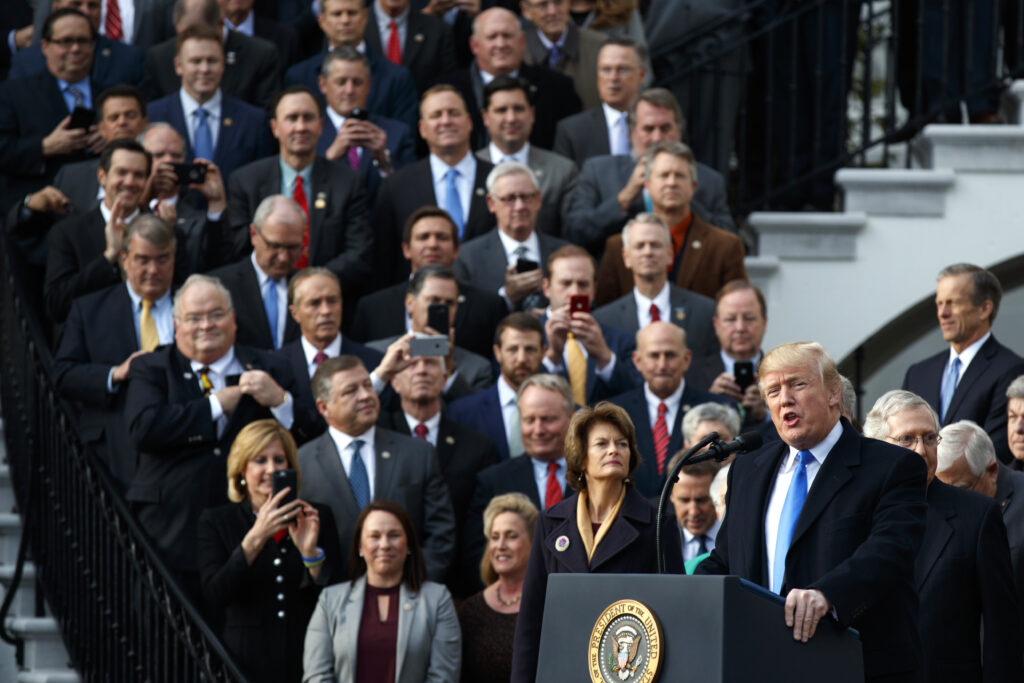
Perhaps nowhere is the choice facing voters next Tuesday more vividly on display than in the battle for control of the U.S. House. Democrats are fielding more women and minority candidates than ever, while Republicans are trying to hold their majority with mostly white men. The disparity highlights a trend that has been amplified under President Donald Trump, with the two parties increasingly polarized along gender and racial lines as much as by issues. The result is that, in an election season playing out against the backdrop of bomb threats, violence and a charged immigration debate, the parties are presenting voters starkly different pictures of American leadership. Democrats have nominated more than 180 female candidates for the House, a new record. But while voters could send more than 100 of them to victory, Republicans could have fewer women than now in their ranks next year due to retirements and tough races, according to election analysts. Overall, nearly 9 in 10 House Republicans will be white men when the new Congress convenes in January. The racial divide is even starker. House Republicans now count just over a dozen minority members, a number that’s not expected to change much after the election. The lack of minorities in the conference comes into sharp visual focus when House Republicans gather in a large group, as they did last December when they celebrated the passage of tax cuts with Trump at the White House. Meanwhile, African-American, Latino and Asian-American lawmakers make up almost half the House Democratic caucus. And for the first time, less than half the Democratic candidates for the House are white men, and the Democrats are poised to send the first Native American and Muslim-American women to the House. It’s what the Reflective Democracy Campaign calls a “historic shift.” After Tuesday’s election, it’s likely that 87 percent of Republicans in the House will be white men, compared to just 37 percent for Democrats, said David Wasserman, who analyzes races for the Cook Political Report. Marc Hetherington, a professor of political science at the University of North Carolina at Chapel Hill, said the trend began long before this year’s election. “There’s a relatively easy explanation — the Republican Party over the past 20 years has become the party of white men,” he said. At the same time, “Democrats have come to be seen as the party of minorities.” Political scientists have been debating whether Congress’ low approval rating — now 21 percent — has something to do with lawmakers not seeming to reflect the country they represent, said Matt Barreto, a professor at UCLA who is also a pollster working to mobilize Latino voters this cycle. Overall, while the House is closer to reflecting the makeup of the country, which is still majority white, the representation is lopsided between the parties. “Everyone wants a representative from their community to stand up for their issues,” Barreto said. For the House, he said, “It’s the entire point: They’re representatives.” Democrats need a net gain of 23 seats to win back the House in the election on Tuesday. Enthusiasm has seemed to be on their side, especially in fundraising, but it’s unclear if that energy will be enough to win districts that swung to Trump in 2016 or have traditionally favored Republicans. The outcome could hinge on the suburbs, where Democrats are hoping that a voter backlash against Trump and GOP policies will help carry their candidates to victory. One closely watched race is outside of Richmond, Virginia, where Republican Rep. Dave Brat, a one-time tea party favorite, is facing a stiff challenge from political newcomer Abigail Spanberger, a former CIA operative. Brat was campaigning over the weekend at the Innsbrook Pumpkin Palooza, pausing to watch a pumpkin catapult as he mingled with voters. Trump supporter Jen Dodge from nearby Glen Ellen said she’s all for bringing more diversity to Congress. But as an employment recruiter, she said she also wants the best candidate for the job. And she said she appreciates what the president and the Republican Congress have done for the economy, especially by passing tax cuts. “We really need people in the Congress who are going to speak the best for the people,” she said. Brat, she said, “does what he says he’s going to do.” Down the road at a community forum with Spanberger, optometrist Lisa Bennett said she wants lawmakers who listen to voters. “American people are frustrated,” she said, recalling the protesters who confronted senators on Capitol Hill over Brett Kavanaugh’s confirmation to the Supreme Court. “You shouldn’t have to stand in an elevator and yell at your representative.” The diversity gap between the parties has been growing since the civil rights battles of the 1960s, when white voters shifted toward Republicans and the party’s support from African-Americans plummeted. Republicans set out to attract more votes from minorities and particularly Latinos after their election losses in 2012, but Trump turned that political strategy on its head in 2016, showing they could win by pulling white voters away from Democrats. Now the president’s coalition is being put to the test. After conducting a poll of 72 competitive House districts, the Cook Political Report and LSU Manship School said this year’s election “feels like 2010, in reverse.” Almost half of Americans, 49 percent “feel frustrated” about Trump’s presidency. That’s the same share who said they felt frustrated about President Barack Obama during that year’s midterm elections, when Democrats lost the majority in a wave election fueled by conservative newcomers eager to confront the White House. Republished with permission from the Associated Press.
Russia probe revival expected if Democrats win House

House Democrats are expected to reopen the investigation into Russian interference in the 2016 election if they win the majority in November. But they would have to be selective in what they investigate. California Rep. Adam Schiff, the top Democrat on the House intelligence panel, has said his party would have to “ruthlessly prioritize the most important matters first.” The Republican-led Intelligence Committee was the only House panel to investigate Russian meddling, and its investigation is now closed. Republicans say they found no evidence of collusion between Russia and President Donald Trump‘s campaign. Democrats say Republicans ignored key facts and important witnesses and want to restart parts of the investigation if they win the House. But some Democrats also worry that there could be a political cost if they overreach. Schiff and other lawmakers say they are closely watching special counsel Robert Mueller‘s Russia investigation and the Senate’s Russia probe to look for gaps that they could fill. And if Mueller issues any findings, their investigative plans could change. “My sense is that we want to be precise,” says California Rep. Eric Swalwell, a Democratic member of the intelligence panel. Here’s a look at what Democrats are likely to investigate if they take the House majority. ___ MONEY LAUNDERING Schiff has repeatedly said a priority for Democrats would be investigating whether Russians used laundered money for transactions with the Trump Organization. Trump’s businesses have benefited from Russian investment over the years. Schiff said he wants to know whether “this is the leverage that the Russians have” over Trump. Other committees might also want to look into money laundering, including the House Financial Services panel. It’s unclear whether Mueller is probing money laundering related to the president’s business. ___ MORE WITNESSES The Democrats issued a list in March of several dozen people whom the committee hadn’t yet interviewed when the Russia investigation was shut down. Democrats would want to call in some — but probably not all — of those witnesses. Former Trump campaign advisers Michael Flynn, Paul Manafort, Rick Gates, and George Papadopoulos are among them. They all pleaded guilty to various charges in the Mueller probe and have cooperated with prosecutors. Important witnesses whose credibility Democrats have questioned might also be called back. That includes Trump’s former personal lawyer, Michael Cohen, who pleaded guilty in federal court in August to campaign-finance violations and other charges, and prominent Trump supporter Erik Prince, who met with Russians during the campaign. Prince was defiant in an interview with the intelligence panel in December. “I believe there are those who were less than candid with us,” says Illinois Rep. Mike Quigley, a Democratic member of the committee, referring to Cohen and Prince, among others. Democrats have said they also want additional documents that Republicans refused to subpoena. ___ PUBLIC HEARINGS House Republicans limited their Russia investigation to the intelligence panel, which traditionally conducts most of its business in secret. Democrats would probably spread the investigation over several other committees, opening it up and allowing for public hearings with top Trump officials. Texas Rep. Joaquin Castro, a Democratic member of the intelligence panel, says they would try to be more transparent. The Republican investigation was “a way to keep everything behind closed doors,” he said. Democrats would also push to provide interview transcripts to Mueller, a step Republicans had resisted. The committee recently voted to make most of its Russia transcripts public, but it’s unclear when that will happen. ___ DONALD TRUMP JR. Democrats have pushed for more information about the president’s son, Donald Trump Jr., and communications with his father and other aides related to a June 2016 meeting between Trump campaign officials and a Russian lawyer. According to phone records he provided to Congress, Trump Jr. had a call with a blocked number several days before the meeting took place; he said he didn’t recall with whom. Democrats want to subpoena additional phone records because Trump Jr. has insisted he didn’t alert his father to the meeting beforehand. They also want more information about his communications with former Trump communications aide Hope Hicks. Democrats may also look into direct messages on Twitter between Trump Jr. and WikiLeaks, the website that released emails from top Democratic officials during the 2016 campaign. Trump Jr. has released those direct messages, in which the website urged him to publicize its leaks. ___ TRUMP’S TAXES Democrats in the majority would probably push for the release of Trump’s tax returns, a task that would be up to the House Ways and Means Committee. Trump broke a decades long tradition by declining to release his returns during the campaign. The Republican House and Senate have declined to ask for them. Lawmakers hope that access to Trump’s taxes would reveal information about his financial entanglements with other countries, among other things. But getting them may not be easy. The tax-writing committees in Congress can obtain tax records from the IRS under the law, but it is possible the Trump administration would refuse to hand them over, prompting a court fight. ___ ISSUES RELATED TO COLLUSION Since Republicans closed the Russia investigation earlier this year, Democrats on the intelligence panel have conducted some of their own investigations despite not having subpoena power. They have made some progress in probing Cambridge Analytica, a data analytics firm once employed by the Trump campaign that improperly gained access to data from millions of social media profiles. They have also investigated Republican operative Peter W. Smith, who worked to obtain Democrat Hillary Clinton’s emails from Russian hackers, according to The Wall Street Journal. Smith died shortly after talking to the paper. ___ PROTECTION FOR ROBERT MUELLER A Democratic House would probably try to move legislation to protect special counsel Mueller. Trump has repeatedly criticized Mueller and his investigation, calling it a witch hunt. Prompted by concerns that Trump may try to fire Mueller, the GOP-led Senate Judiciary Committee approved legislation in April that would give any special counsel a 10-day window to seek expedited
House seat suddenly in play after Trump backer’s indictment
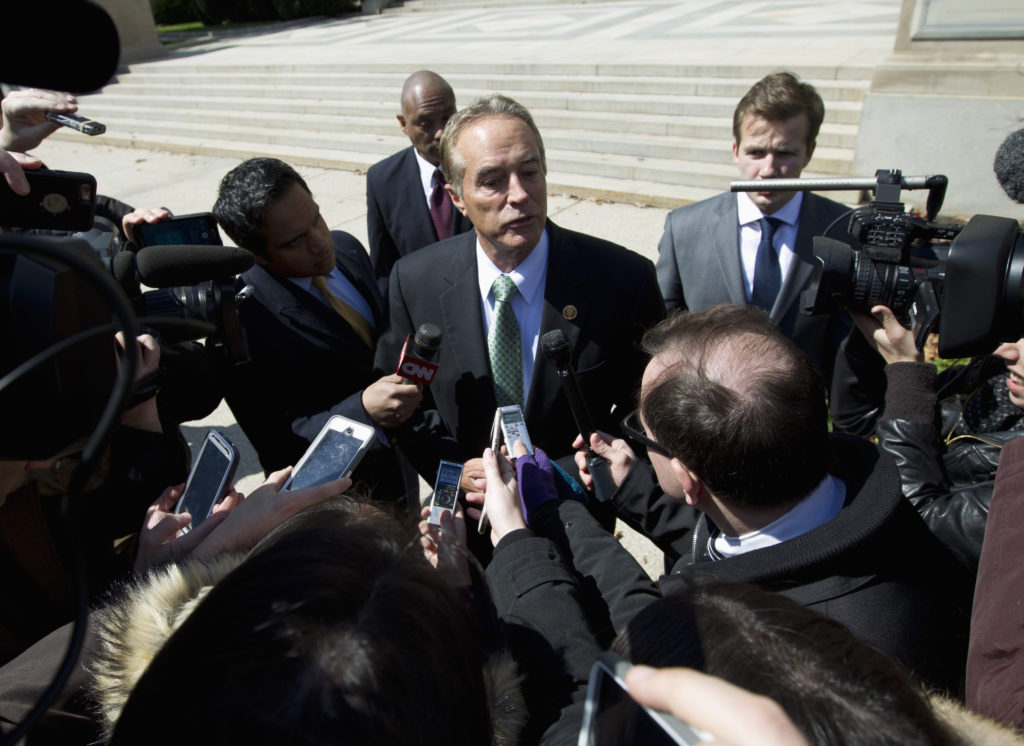
New York’s most conservative congressional district is unexpectedly in play as Republican incumbent Chris Collins, one of President Donald Trump‘s first supporters, fights insider trading charges while seeking re-election. Republican leaders in a western New York district that Trump swept overwhelmingly in 2016 are counting on party and presidential loyalty, even if it means voting for someone that even they wanted off the ballot. “This district is Trump country, and it will continue to be,” said Erie County Republican Party Chairman Nicholas Langworthy. “It’s a conservative Republican district, and I expect that when the dust settles on election night it will re-elect a conservative Republican to the seat.” Democratic challenger Nate McMurray is still the underdog but says his volunteers and donations have surged since Collins was charged in August, and his crowds have gone from handfuls to hundreds. “It’s like an avalanche that started out with a little snowball that’s rolling downhill and getting bigger and bigger every day,” McMurray, a Grand Island town supervisor, said recently to a roomful of supporters. They included Tom Perez, the Democratic National Committee chairman, who dropped in to drum up enthusiasm in what had been a little-watched race. Once considered a sure win for Republicans, Real Clear Politics now lists the race as a “toss-up,” and the Cook Political Report in mid-September moved the seat from “likely Republican” to merely “lean Republican.” McMurray said this week his internal polling showed the race to be a dead heat. With Democrats forecast to make gains in the House, for some voters in the Republican-advantaged district, the decision will be more about keeping the challenger out than Collins in, analysts said. “The old phrase of ‘all politics is local,’ the Tip O’Neill statement? These local races are not so local anymore,” American University political science professor Jan Leighley said. Collins, with a reported net worth of $44 million one of the wealthiest members of Congress, is accused of illegally leaking confidential information about a biopharmaceutical company to his son and the father of his son’s fiancée that allowed them to avoid hundreds of thousands of dollars in stock losses. The most serious charge carries a potential prison term of up to 20 years. If he wins and is later convicted and forced to resign, a special election would be held. The 68-year-old Collins pleaded not guilty and initially vowed to continue his re-election campaign. He then agreed to be removed from the ballot “in the best interests of the constituents,” only to reverse course again and announce he would stay on the ballot — even as party leaders who had spent weeks exploring legal maneuvers to remove him were preparing to announce a replacement. “The stakes are too high to allow the radical left to take control of this seat in Congress,” Collins said in a Sept. 19 statement. Collins is one of two Republican congressmen running for re-election while under indictment. Rep. Duncan Hunter, of California, has pleaded not guilty to spending campaign funds for personal expenses. Hunter and Collins were the first two Republicans to endorse Trump in the Republican presidential primaries, and their indictments drew a critical Sept. 3 tweet from Trump aimed at Attorney General Jeff Sessions. Tweeted Trump: “Two easy wins now in doubt because there is not enough time.” Since entering the race, Collins has limited his personal appearances largely to friendly gatherings like the Republican Women’s Autumn Brunch and the Newstead GOP Sportsman Extravaganza. He declined to be interviewed by The Associated Press. “A lot of folks just happy that I’m back in the race,” he told WIVB this week. “They know what’s at stake. … Every seat matters. As you read the pundits now, it’s going to be a very close election to see who is going to be in the majority of the House come next year.” Collins, a businessman who made is money by buying distressed businesses and turning them around, proudly carries an A+ rating from the National Rifle Association and cites among his priorities never increasing entitlement programs, reforming the tax code and balancing the federal budget in 10 years. He has been on the air with negative television ads, including one that was assailed by critics as racist. It showed McMurray speaking Korean as a portrait of North Korean leader Kim Jong-Un floated in the background and captions falsely implied McMurray was talking about sending American jobs to Asia. McMurray, a lawyer, studied the development of constitutional democracy in South Korea as a Fulbright scholar. His campaign has focused on health care for all, protecting Social Security, the environment and strengthening infrastructure. He said he supports gun rights but also universal background checks and a ban on bump stocks. Out in the district, 23-year-old line cook Brett Schuman said the allegations against Collins were enough to sway him. “When there’s anything happening, criminal or otherwise, I’m going to defer to the other party.” Retired engineer Don Lloyd said he liked McMurray’s background and education but would still vote for Collins, if only to help Republicans keep control of the House and preserve Trump’s agenda. Democrats need a net gain of 23 seats to take control of the chamber. “Let’s face it, the election isn’t about Chris Collins — it’s about Trump,” said Lloyd, 70. “So hold your nose, I guess.” Republished with permission from the Associated Press.
Martha Roby: House takes steps to rebuild our military

Over the last year and a half, our unified government has taken big steps to unleash our economy and foster growth here in the United States. Because of this work, our economy is strong today. In fact, since the enactment of our historic tax overhaul six months ago, more than one million new jobs have been created. Because of this work, businesses are growing, Americans are working, and our economy is strong. Now, we must do the work required to ensure that our military is strong, too, especially after the damaging sequestration cuts and funding limitations put into place by the Obama Administration. As a member of the Defense Appropriations Subcommittee, I have been grateful to have a seat at the table as we’ve worked to properly fund our military through H.R. 6157, the Department of Defense Appropriations Act, which recently passed the House of Representatives by a vote of 359-49. I was proud to vote in favor of the legislation, and I spoke on the House floor to urge my colleagues to support it, too. Alabama’s Second District is home to two of our nation’s finest military installations, Maxwell-Gunter Air Force Base in Montgomery, and Fort Rucker down in the Wiregrass. I am especially glad that this funding bill provides the resources to support their critical missions. H.R. 6157 contains an overall amount of $674.6 billion in military funding. This amount covers important funding for Army Aviation programs important to Fort Rucker, including resources for four additional Lakota helicopters, 58 additional Blackhawk helicopters, and 66 additional Apache helicopters. The bill also provides support for other key Alabama programs, including additional funding for a total of three Littoral Combat Ships that are built in Mobile, resources to upgrade the Stryker Vehicle, and strong funding for missile programs, including THAAD, Hellfire, and LRASM. Also importantly, the bill allocates funding for 93 F-35 aircraft, some of which will soon be flown by the 187th Fighter Wing at Dannelly Field in Montgomery. This bill is of critical importance to our national security and the missions in Alabama’s Second District. By passing this legislation, the House has kept our promise to rebuild our military and support our servicemembers. I’d like to share a few more reasons why this bill is so very important. First, it provides a 2.6 percent pay increase to our men and women in uniform – the largest raise they have received in nine years. Our service-members sacrifice their own personal safety to protect us, and they deserve this pay raise. Second, the bill allocates $34.4 billion for the Defense Health Program so troops, their families, and retirees can receive the care they need. This program includes funding for cancer research, psychological health research, and more. Third, it addresses our military readiness problem. It is no secret that our military faced damaging cuts under the Obama Administration that have significantly hindered readiness. This bill makes investments in training, maintenance, and other military readiness programs. Fourth, the bill upgrades our military equipment. The legislation provides more than $145 billion to upgrade and secure military equipment across all branches of the military, including replenishing our Naval fleet. Fifth, this legislation supports counterterrorism efforts. The bill directs funding towards our military’s current operations against terrorist organizations by supporting additional personnel, facilities, and equipment. Our country still faces real and serious threats across the globe, and it is imperative that we enable the Pentagon to not only plan for today, but to be prepared for emerging threats around the world. The bottom line is that the Fiscal Year 2019 Defense funding bill continues our efforts to rebuild our military after several years of harmful cuts and hollowing out. Now, we are making sure the military has the tools and resources it needs to rebuild. One of Congress’ most fundamental constitutional duties is to “provide for the common defense.” This important legislation fulfills that responsibility and ensures that our military not only remains the tip of the spear, but that it grows stronger and well-equipped to face whatever challenges come our way. https://www.youtube.com/watch?v=z5f9vY00kpU ••• Martha Roby represents Alabama’s Second Congressional District. She lives in Montgomery, Alabama, with her husband Riley and their two children.
House rejects Republican immigration bill, ignoring Donald Trump
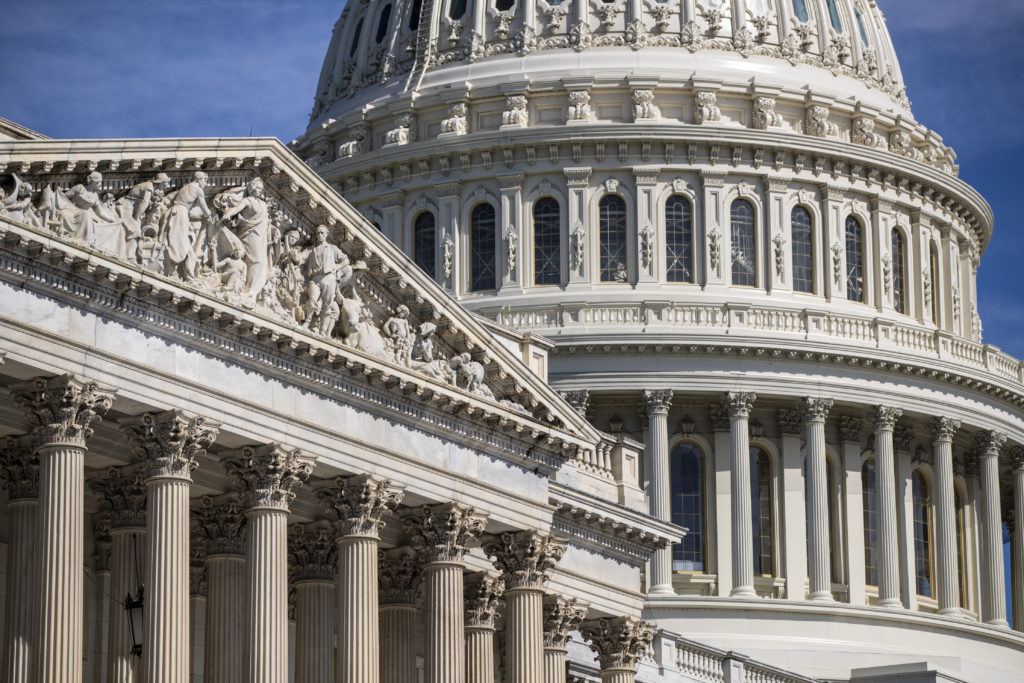
The Republican-led House resoundingly rejected a far-ranging immigration bill Wednesday despite an eleventh-hour endorsement by President Donald Trump, as the gulf between the GOP’s moderate and conservative wings proved too deep for leaders to avert an awkward election-year display of division. The bill was killed 301-121, with nearly half of Republicans opposing the measure. The depth of GOP opposition was an embarrassing showing for Trump and a rebuff of House leaders, who’d postponed the vote twice and proposed changes in hopes of driving up the tally for a measure that seemed doomed from the start. The roll call seemed to empower GOP conservatives on the fraught issue. Last week a harder-right package was defeated but 193 Republicans voted for it, 72 more than Wednesday’s total. In Wednesday’s vote, 112 Republicans voted “no,” including many of the party’s most conservative members. “We need to start securing the border and not reward bad behavior, and that’s what this bill did,” said Rep. Roger Williams, R-Texas. Conservatives have opposed the bill’s provision offering a chance at citizenship for hundreds of thousands of immigrants who came to the U.S. illegally as children. Calling it amnesty, they have said it doesn’t do enough to limit the number of relatives who immigrants here legally can sponsor for residence. Even if it passed, the bill rejected Wednesday would have been dead on arrival in the closely divided Senate, where Democrats have enough votes to kill it. House Democrats voted unanimously against it. “Show some compassion,” said Rep. Adriano Espaillat, D-N.Y., who came to the U.S. from the Dominican Republic with his parents at age 9. “Will we step up to be the country that allowed me, as a young boy, to find safety with my mother and father?” GOP leaders have been considering a Plan B: a bill focused narrowly on barring the government from wresting children from migrant families caught entering the country without authorization. With television and social media awash with images and wails of young children torn from parents, many Republicans have wanted to pass a narrower measure addressing those separations before Congress leaves at week’s end for its July Fourth break. But that seemed unlikely. GOP aides said Republicans had yet to agree on bill language, and the effort was complicated by a federal judge who ordered that divided families be reunited with 30 days. Republicans have been working on legislation that would keep migrant families together by lifting a court-ordered, 20-day limit on how long families can be detained. Senators are trying craft a bipartisan plan. Trump has issued an executive order reversing his own family separation policy, but around 2,000 children remain removed from relatives and are generating damaging daily stories that Republicans would love to halt. Besides creating a pathway to citizenship for some young immigrants, the defeated bill would provide $25 billion for Trump to build his coveted wall on the border with Mexico. It would restrict family-based immigration and bar the Homeland Security Department from taking migrant children from parents seized crossing into the country without authorization. In a startling turnabout earlier Wednesday, Trump made an all-caps pitch for the bill. Just Friday, he’d urged Republicans to stop wasting time on the effort until after the November elections. In his latest display of whiplash on the issue, Trump tweeted, “HOUSE REPUBLICANS SHOULD PASS THE STRONG BUT FAIR IMMIGRATION BILL, KNOWN AS GOODLATTE II, IN THEIR AFTERNOON VOTE TODAY, EVEN THOUGH THE DEMS WON’T LET IT PASS IN THE SENATE.” The vote capped months of futile GOP efforts to pass wide-ranging legislation on an issue that could color scores of congressional races in this fall’s contest for House and perhaps Senate control. The Senate rejected three proposals in February, including one reflecting Trump’s hard-line policies and two bipartisan plans. Democrats and centrist Republicans from swing districts say the GOP could suffer because the party, steered by Trump’s anti-immigrant harangues, could be alienating pivotal moderate voters. But conservatives relish such tough stances. Conservative Rep. Steve King, R-Iowa, who voted “no,” said lawmakers “couldn’t go home and face their constituents and say ‘I just gave you the largest amnesty ever without really a guarantee of enforcement.’” But Rep. Tom Cole, R-Okla., who backed the measure, said, “Some people can’t get to yes no matter what you do, and some people are just afraid of the issue.” Rep. Carlos Curbelo, R-Fla., and Rep. Jeff Denham, R-Calif., from competitive districts with large numbers of Hispanic voters, helped force Ryan to stage immigration votes. This spring they launched a petition that could have led to House passage of liberal-leaning measures creating a pathway to citizenship, bills backed by Democrats but opposed by most Republicans. Leaders headed off the petition by urging GOP lawmakers to not sign it, partly by crafting the compromise package the House rejected Wednesday. After the vote, Curbelo said too many lawmakers “simply lacked the courage” to help “victims of a broken immigration system.” Denham said the vote made it “very obvious that we need to have a bipartisan solution” — an avenue that the approach of campaign season makes highly unlikely. The more conservative bill the House rejected last week clamped down on legal immigration and provided no way for the young immigrants to become citizens. Republished with permission from the Associated Press.
House rejects hard-right immigration bill, baring GOP divide

The House killed a hard-right immigration bill Thursday, and Republican leaders delayed a planned vote on a compromise GOP package with the party’s lawmakers fiercely divided over an issue that has long confounded them. The conservative measure was defeated 231-193, with 41 Republicans — mostly moderates — joining Democrats in voting against it. Those defections — nearly 1 in 5 GOP lawmakers — underscored the party’s chasm over immigration and the election-year pressures Republicans face to stay true to districts that range from staunchly conservative to pro-immigrant. Thursday’s vote set the stage for debate on the second bill, this one crafted by Republican leaders in hopes of finding an accord between the party’s sparring moderate and conservative wings. That compromise was considered too lenient by some conservatives and seemed likely to fall, too, and aides said the final roll call would wait till Friday. Rejection of both would represent an embarrassment for President Donald Trump, who had embraced them. As if the internal GOP turmoil was not enough, the party’s political exposure on the issue has been intensified by heartbreaking images of migrant children separated from families and complicated by opaque statements by Trump. At the White House, Trump defended his administration’s “zero tolerance” policy of prosecuting all migrants caught illegally entering the country, a change that has caused thousands of families to be divided while the parents are detained. He said without it, “you would have a run on this country the likes of which nobody has ever seen.” He said he was inviting Congress’ top two Democrats, House Minority Leader Nancy Pelosi and Senate Minority Leader Chuck Schumer, to the White House for immigration bargaining. He called them “extremist open-border Democrats.” And in a tweet that seemed to undermine House leaders’ efforts to round up votes, he questioned the purpose of their legislation by suggesting it was doomed in the Senate anyway. Trump issued an executive order Wednesday aimed at reversing his own policy of taking immigrant children from their detained parents, but emotions remained high. “I was welcomed here,” a tearful Rep. Norma Torres, D-Calif., said during House debate, describing her journey to the U.S. as a child from Guatemala. “I was not put in a freezing cell.” In an embarrassing detour, the House used an early procedural vote to correct what Republicans called a drafting error — language providing $100 billion more than they’d planned to help build Trump’s proposed border wall with Mexico. Instead of giving initial approval for $24.8 billion spread over the next five years, the legislation said it would open the door to $24.8 billion “for each” of the next five years. The rejected conservative bill would have granted no pathway to citizenship for young “Dreamers” who arrived in the country illegally as children, curbed legal immigration and bolstered border security. The second was a compromise between GOP moderates and the party’s conservatives that included an opportunity for citizenship for the young immigrants. It provides $25 billion for Trump’s wall, restrictions on legal immigration and language requiring the Homeland Security Department to keep migrant families together while they’re being processed for illegal entry to the U.S. Democrats oppose both measures as harsh. “It is not a compromise,” House Minority Leader Nancy Pelosi, D-Calif., told reporters. “It may be a compromise with the devil, but it is not a compromise with the Democrats.” Even before votes began, Trump complicated GOP efforts to round up votes. “What is the purpose of the House doing good immigration bills when you need 9 votes by Democrats in the Senate, and the Dems are only looking to Obstruct (which they feel is good for them in the Mid-Terms),” Trump wrote. “Republicans must get rid of the stupid Filibuster Rule-it is killing you!” In the unlikely event that the House approved the GOP compromise, it seemed certain to go nowhere in the GOP-run Senate. Democrats there have enough votes to use procedural delays to kill it. Sixty votes are needed to end filibusters. On Wednesday, Trump reversed himself and took executive action aimed at curbing the separation of families. His order seemed to stem some of the urgency for Congress to act. But GOP leaders were eager to hold the votes anyway. The roll calls would let Republicans assert to voters that they tried addressing the immigration problem. “Our members wanted to express themselves on an issue they care a great deal about,” Speaker Paul Ryan said. Passage of the GOP compromise was always a long shot, but failure may now come at a steeper price. Republicans and Trump have raised expectations that, in control of Congress and the White House, they can fix the nation’s long-standing immigration problems. When the crisis of family separations erupted at the border, GOP leaders revised the compromise bill to bolster a provision requiring parents and children to be held together in custody. It did so by eliminating the 20-day cap on holding minors and allowing indefinite detentions. Even though Trump has acted unilaterally to stem the family separations, lawmakers still prefer a legislative fix. The administration is not ending its “zero tolerance” approach to border prosecutions. If the new policy is rejected by the courts, which the administration acknowledges is a possibility, the debate could move back to square one. Senate Republicans, fearing Trump’s action will not withstand a legal challenge and eager to go on record opposing the administration’s policy, have unveiled their own legislation to keep detained immigrant families together. In the House, moderate Republicans forced the immigration debate to the fore by threatening to use a rare procedure to demand a vote. Led by Curt Curbelo and Rep. Jeff Denham, R-Calif., many are from states with large populations of young “Dreamer” immigrants who now face deportation threats under Trump’s decision to end the Obama-era Deferred Action for Childhood Arrivals program. A federal court challenge has kept the DACA program running for now. Republished with permission from the Associated Press.
Alabama’s 2018 U.S. House elections poised to be more competitive than last
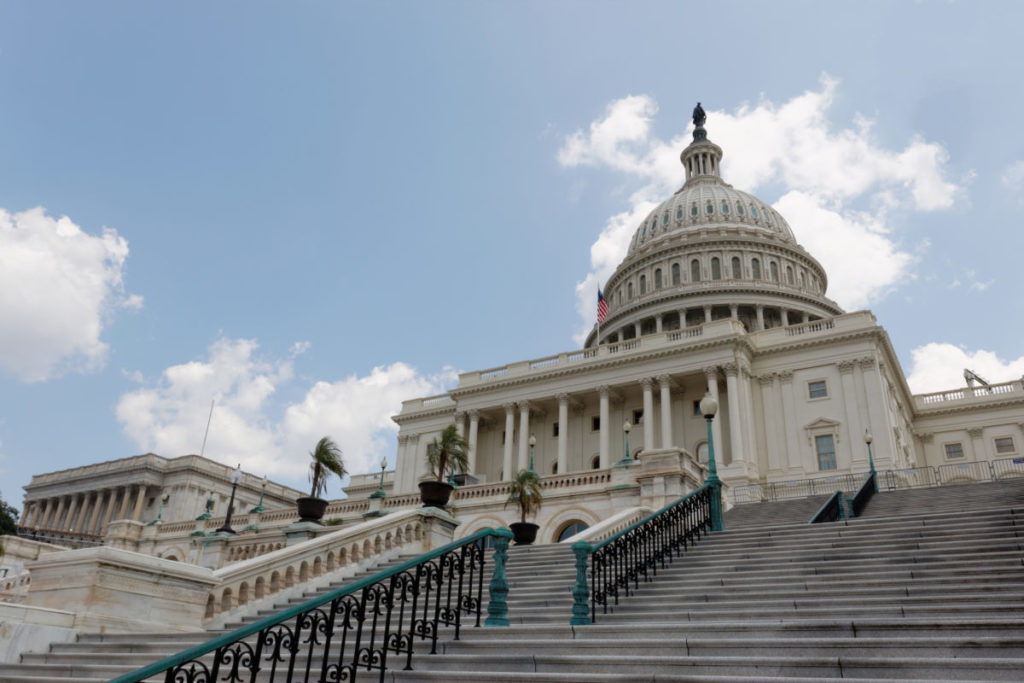
The qualifying for congressional races in Alabama ended at 5 p.m. Friday, and one thing’s for sure: Alabama voters will have plenty of choices in the 2018 elections. Republican incumbents Bradley Byrne (AL-01), Mike Rogers (AL-03) and Gary Palmer (AL-06) will advance to the Nov. 6 general election without a primary challenge. Robert Aderholt (AL-04) and Mo Brooks (AL-05) will each face off with one other Republican challenger. Meanwhile four-term U.S. Rep. Martha Roby (AL-02) will face off against a sea of Republican primary challengers — four. Democratic incumbent Terri Sewell (AL-07) is Alabama’s only candidate who not only has no primary challenger, but no challenger in the general election as well, making her the Yellowhammer State’s only incumbent guaranteed to advance to the next Congress. 2018’s lineup is a stark contrast from 2016, when Bryne, Aderholt and Sewell all ran unopposed. In total, both parties will be well represented in the June 5 primary elections, as the GOP has put up 12 candidates, and the Democrats 11. Here’s who’s qualified to the run for the U.S. House of Representatives in 2018: (by district and party, in alphabetical order) District 1 Republican Bradley Byrne (incumbent) Democrats Robert Kennedy, Jr. Lizzetta Hill McConnell District 2 Republicans Tommy Amason Bobby Bright Rich Hobson Barry Moore Martha Roby (incumbent) Democrats Tabitha Isner Audri Scott Williams District 3 Republican Mike Rogers (incumbent) Democrats Mallory Hagan Adia McClellan Winfrey District 4 Republicans Robert Aderholt (incumbent) Anthony Blackmon Democrats Lee Auman Rick Neighbors District 5 Republicans Mo Brooks (incumbent) Clayton Hinchman Democrat Peter Joffrion District 6 Republican Gary Palmer (incumbent) Democrat Danner Kline District 7 Republican N/A Democrat Terri Sewell (incumbent)
Alabama at risk of losing a seat in Congress after 2020 census
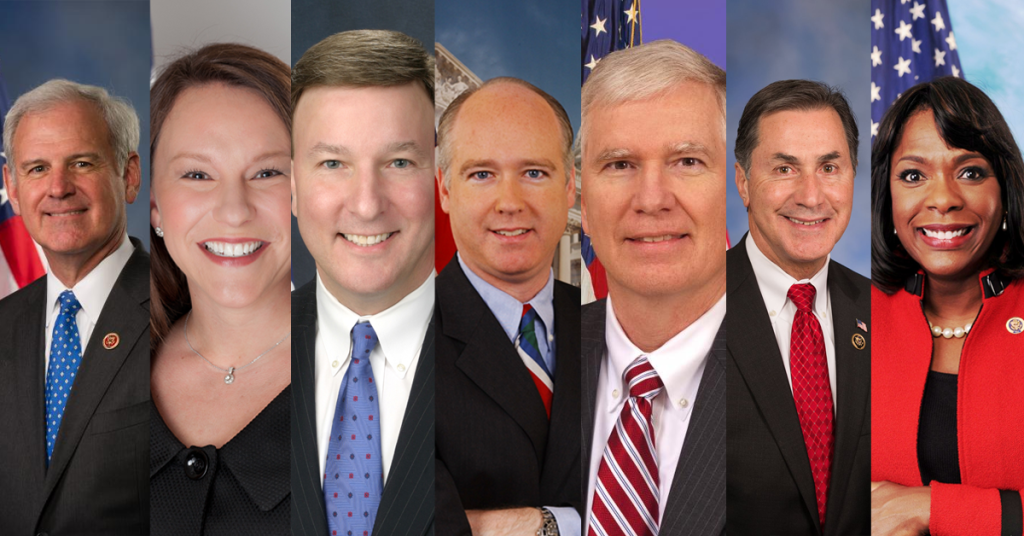
Speculation has officially begun — Alabama is could lose one of its seven U.S. House seats after the 2020 U.S. Census, according to projections. This could happen as the results of the census are used to divide 435 congressional seats and $675 billion in federal government funding a year. Over the past seven years, Alabama’s growth has slowed while the U.S. population has risen. If everyone in the state isn’t accounted for, Alabama could lose one of its seats. What a lost seat means for Alabama While the census is still three years away, political leaders across the state are starting to worry about what that the loss of a seat would mean for the Yellowhammer State. “Alabama is in jeopardy of losing a congressperson,” Governor Kay Ivey told the Association of County Commissions of Alabama in August. “But more devastating than that could be the fact that we will lose federal funding.” Ivey is referring to the more than $7.5 billion in federal funding the state receives each year. Executive Director of the Arise Citizens’ Policy Project (ACPP), Kimble Forrister, agrees. The loss of federal funding could have devastating effects on the state. “Alabama can’t afford to be undercounted in the upcoming Census,” said Forrister. “Investments in Medicaid, housing and transportation make Alabama a better place to live and work, and we need to ensure our state doesn’t get shortchanged on the federal funding that helps make those services possible.” Losing a seat would also effect the state’s sway in the Electoral College during Presidential Elections considering the fact electors are tied to the number of representatives in Congress. The history of Alabama’s House seats It’s been nearly half a century, since 1973, since the Yellowhammer State last lost a congressional seat, and well over a century, 144 years dating back to 1873, since it had fewer than seven representatives in the U.S. House of Representatives. But despite strong population growth between 2000 and 20100, the state’s growth has slowed the past seven years, putting a House seat in jeopardy. Here’s the history of Alabama’s House seats: 1818 – 1819: 1 non-voting delegate 1819 – 1823: 1 seat 1823 – 1833: 3 seats 1833 – 1843: 5 seats 1843 – 1863: 7 seats 1863 – 1873: 6 seats 1873 – 1893: 8 seats 1893 – 1913: 9 seats 1913 – 1933: 10 seats 1933 – 1963: 9 seats 1963 – 1973: 8 seats 1973 – present: 7 seats How Alabama reapportions a lost seat Should Alabama lose a House seat, the state legislature would redraw the districts, as a regular statute, subject to gubernatorial veto by Ivey. In 2011, Alabama’s legislative redistricting committee adopted guidelines to help streamline the process. The determined districts should be contiguous, reasonably compact, follow county lines where possible, and maintain communities of interest to the extent feasible; the committee further noted it would attempt to avoid contests between incumbents wherever possible. All meetings of the reapportionment committee and its subcommittees will be open to the public and all plans presented at committee meetings will be made available to the public As state lawmakers discuss possible redrawn maps, citizens will be also allowed to submit their own redistricting plans, using ESRI redistricting software. All meetings of the reapportionment committee and its subcommittees will be open to the public and all plans presented at committee meetings will be made available to the public. 2020 census deemed “high risk” The 2020 Census has already been listed by the Government Accountability Office (GAO) as a “high risk” federal program. “The bureau has not addressed several security risks and challenges to secure its systems and data, including making certain that security assessments are completed in a timely manner and that risks are at an acceptable level,” Eugene Dodaro, the US Comptroller General, said in a statement during a US Senate hearing last week. Dodaro explained in order to save money, the 2020 census plans to heavily rely on technology, rather than canvassing and responses by mail. As part of this plan the GAO has identified 43 electronic systems that will be used in the 2020 census. According to Dodaro none of the systems have undergone the required security certification – and one, the code used to tabulate all the data, won’t even finish development until March 2019 at best. Which is precisely why Ivey is pushing for local help come census time. “I’m dead serious about this, folks. We need your help,” Ivey said in August reiterating the need of local involvement to ensure every state resident gets counted for in the census. Her insistence is due to the fact that the difference between the state keeping or losing one of its House seats could come down to fewer than a thousand people, just as it did in Utah following the 2010 census. 2020 reapportionment prediction map [Photo Credit: Election Data Services]
Bradley Byrne: How we fund the government

Arguably, Congress’s most important power is the power of the purse. Through funding bills, Congress has an important opportunity to set the direction of the government. Founding Father James Madison called it “the most complete and effectual weapon with which any constitution can arm the immediate representatives of the people”. Unfortunately, in recent years, Congress has failed at this basic constitutional responsibility. For far too long, Congress has operated from manufactured crisis to manufactured crisis, putting off passing government funding bills until the last possible minute. Even worse, Congress has also fallen into a bad habit of just passing short-term spending bills known as Continuing Resolutions (CR) that simply hold federal spending in place. This is exactly what happened just a few weeks ago. I voted against that bill because it’s unacceptable to operate the government in that manner. Fortunately, for the first time since 2009, the House last week passed all twelve of the individual government funding bills before the end of the fiscal year on September 30th. Only in Washington would simply doing your job be considered a major accomplishment, but this was a big breakthrough in the government funding process and it is important to enacting President Trump’s agenda. For example, our funding bills crack down on illegal immigration and fully fund President Donald Trump’s request for the border wall. The bills also roll back burdensome regulations, provide a raise to our troops, defund Planned Parenthood, cut funds to the IRS and EPA, and boost funding for medical research. While I am proud we got the job done, we still have a lot of work to do. For example, Congress has still not even passed a budget for Fiscal Year 2018 yet, and the Senate has yet to consider even a single funding bill. I want to take a minute to clarify the difference between the federal budget and the funding bills. While the terms are often interchanged, they are actually very different. The budget is more of an aspirational document that does not carry the force of law, but it serves as a blueprint for the funding bills. Even more, the budget submitted each year by the President is truly just a recommendation that Congress uses to draft our own budget. Even still, the budget is important because it sets topline spending levels and provides a more long-term budget outlook. The funding bills are where the money is actually spent. These are very specific bills that lay out line item appropriations for most government agencies and programs. The funding bills run on the fiscal year calendar, so from October 1st to September 30th each year. If the funding bills are not passed before September 30th, a government shutdown occurs. When the process works like it is supposed to, the president submits his budget request in February, the House and Senate pass budget resolutions by the middle of the year, and then pass the twelve individual funding bills by September 30th. We must return to this process. When the system is broken, as it currently is, it makes it much harder to set federal priorities and cut down on wasteful or unnecessary government programs. This is why I think it is so important we return to regular order and get our work done on time. I understand it is difficult to make spending decisions in today’s tight budget environment, but the American people elected us to make difficult choices. While I’m glad the House got our work done this year, we must keep pushing to fix the overall process and restore fiscal sanity in Washington. • • • Bradley Byrne is a member of U.S. Congress representing Alabama’s 1st Congressional District.


